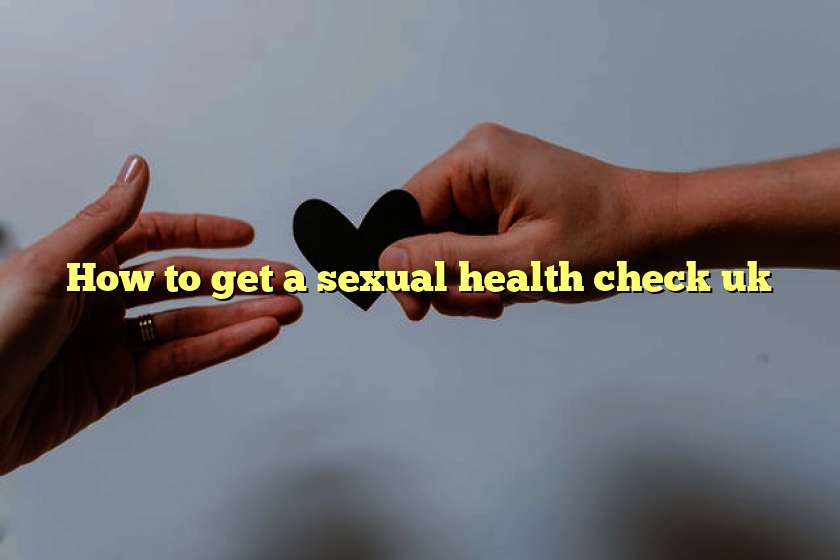Getting tested and treated for sexually transmitted infections (STIs) is straightforward and confidential. Most infections can be cured.
A sexual health or genitourinary medicine (GUM) clinic specialises in sexual health, and can provide tests and treatment for many STIs.
Visiting an STI clinic
You can make an appointment to go to an STI clinic, or sometimes there’s a drop-in clinic, which means you can just turn up without the need for an appointment.
You might feel embarrassed, but there’s no need – the staff at these clinics are used to testing for all kinds of infections. It’s their job and they won’t judge you. They should do their best to explain everything to you and make you feel at ease.
You can go to a sexual health clinic whether you’re male or female, whatever your age, regardless of whether or not you have STI symptoms. If you’re under 16, the service is still confidential and the clinic won’t tell your parents.
If they suspect you or another young person is at risk of harm, they might need to tell other healthcare services, but they will talk to you before they do this.
Find a sexual health clinic.
Your name and details
When you go to a sexual health clinic, you’ll be asked for your name and some contact details.
You don’t have to give your real name if you don’t want to. If you do, it will be kept confidential. Your GP won’t be told about your visit without your permission.
If you have tests and the results aren’t available during your visit, the clinic will need to contact you later, so give them the correct contact details.
The clinic will ask how you want to receive your results. They can usually be given to you over the phone, by text, or in an unmarked letter.
Answering some questions
You will see a doctor or a nurse, who will ask you about your medical and sexual history.
Be prepared to answer questions about your sex life, including:
- when you last had sex
- whether you’ve had unprotected sex
- whether you have any symptoms
- why you think you might have an infection
You can ask to see a female or male doctor or nurse if you prefer, but you might have to wait longer than usual for one to become available.
Having STI tests
The doctor or nurse will tell you what tests they think you need. They should explain what is going on and why they are suggesting these tests. If you’re not sure about anything, ask them to explain.
The tests might involve:
- a urine (pee) sample
- a blood sample
- swabs from the urethra (the tube urine comes out of)
- an examination of your genitals
- if you’re female, swabs from the vagina, which you can usually do yourself
Testing for chlamydia and gonorrhoea usually requires only a urine sample or a self-taken swab for a woman. Testing for HIV and syphilis needs a blood sample.
Tests for herpes aren’t usually done unless you have sores on your genitals or anus. In this case, a swab will be taken from a sore. This will be uncomfortable for a moment.
Find out more about:
- chlamydia testing
- herpes testing
- syphilis testing
- gonorrhoea testing
- HIV testing
Getting your test results
With some tests, you can get the results – and treatment, if you need it – on the same day. For others, you might have to wait for a week or 2. If this is the case, the clinic will check how you would prefer to receive your results.
If you test positive for an STI, you will be asked to go back to the clinic to talk about your results and the treatment you need.
Many STIs can be cured with antibiotics. Some infections, such as HIV, have no cure, but there are treatments available. The clinic can advise you on these and put you in touch with a counsellor.
If possible, tell your sexual partner and any ex-partners so they can get tested and treated as well.
If you don’t want to do this, the clinic can usually do it for you – it’s called partner notification and the clinic won’t reveal who you are.
Using condoms to protect against STIs
The best way to protect yourself from getting or passing on an infection is to use a condom every time you have sex. The clinic can give you some condoms so you can practice safer sex.
Always buy condoms that have the CE mark or BSI kite mark on the packet. This means they’ve been tested to high safety standards.
Condoms that don’t have the CE mark or BSI kite mark won’t meet these standards, so don’t use them. Get tips on using condoms properly.
Bear in mind that having had an STI once doesn’t make you immune to it – you can get the same infection again.
Other places to go for help
Sexual health and GUM clinics have the greatest expertise in testing and treatments for STIs, but you can also go to:
- your GP
- a young people’s sexual health service – call the National Sexual Health Helpline on 0300 123 7123
- a community contraception clinic
- a pharmacy
They may be able to offer tests for some infections and advise you on where to go for further help.
Text
How often you should be checked depends on how many people you have sex with.
If you don’t have a regular partner and you have casual sex you should go at least once every six months.
If you have lots of sexual partners have a check-up at least every three months.
If you get any symptoms that may be an STI (eg, sores, inflammation or discharge), go to a clinic straight away and don’t have sex until given the all-clear.
Before having sex at the start of a new relationship, have a check-up, especially if you’re thinking about not using condoms (then HIV tests are strongly recommended). A sexual health screen should also include an HIV test.
If you have HIV it’s important to find out whether your viral load is undetectable (and be taking effective treatment) before considering stopping using condoms. Remember that having sex without a condom can lead to other STIs being passed on.
PrEP (pre-exposure prophylaxis) is a course of tablets taken before and after sex that protects against HIV. Consider it if you think it might be for you.
You can test at home for HIV and some other STIs such as chlamydia.
SH:24 provides free and confidential STI testing.
They test for Chlamydia, Gonorrhoea, Syphilis and HIV.
Order a kit on their website here.
Testing for HIV at home
Your test kit will arrive in a plain envelope. It will contain everything you need to provide us with samples that we will test in our lab. Your details will not appear on any of the samples or the freepost return envelope.
Have I got an STI?
Many people with sexually transmitted infections (STIs) have no symptoms.
STIs can pass from one person to another during sex, especially if you don’t use a condom.
It is a good idea to get tested, especially if you have recently changed partners. Most infections can be cured.
Getting your test results
Every test kit has to be sent back to the lab for analysis. There’s a grey freepost return envelope included. Your details will not appear on any of the samples or the freepost envelope, as SH:24 is completely confidential.
They will keep you updated by text message. SH:24 will send a text when your test kit has been dispatched to you and when the lab receives your samples.
SH:24 will text you your test results as soon as possible – always within seven days. If you do have an infection, they will advise you of how to get treatment and further support.
How do I get treatment?
We will send you your results by text message. If you have an infection, SH:24 will advise you to visit your local clinic for treatment. In some cases, an NHS clinician may call you to offer additional advice.
Typically, treatment will include a course of antibiotics, and may require you to attend a clinic in person.
You can also find your nearest sexual health clinic at any time at sxt.org.uk.




